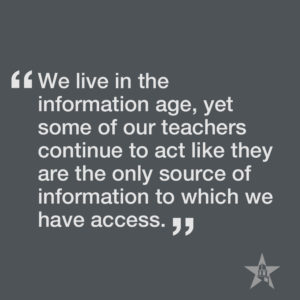Recently, I was scrolling through Facebook when I found a post from one of my old teachers. This teacher shared a study done on high school students, which set out to decide whether typing or handwriting notes is more effective as a study strategy. Not surprisingly, the study concluded that students who wrote out their notes by hand remembered the content better. What surprised me, though, was my teacher’s caption for the post: “Stop telling me that if I’m not using [the latest technological gadget] that I’m not teaching it right!”
 As an education major, to me this seems like a response to an entirely different problem. Of course, I’m not here to tell him that he’s “teaching it wrong.” After all, this teacher was one of my favorites, and I learned a lot from him. My issue with his comment is not that he’s teaching anything wrong, but that he’s not teaching something very important: technological literacy.
As an education major, to me this seems like a response to an entirely different problem. Of course, I’m not here to tell him that he’s “teaching it wrong.” After all, this teacher was one of my favorites, and I learned a lot from him. My issue with his comment is not that he’s teaching anything wrong, but that he’s not teaching something very important: technological literacy.
We live in a world where we have instant access to any kind of information we could possibly want. Don’t know the answer to a math problem? In school, the teachers will tell you to think about it, tell you to figure it out yourself, tell you that it just makes sense. The one thing they won’t permit you to do, though, is take out your phone and look it up. As a high school graduate, when I don’t know the answer, I Google it. Do you see the disconnect here? We live in the information age, yet some of our teachers continue to act like they are the only source of information to which we have access.
This disconnect leads to unhealthy growth. We have a generation of young adults who know how to memorize facts, but don’t know what to do with them. In our “fake news” era, we are saturated with facts, but don’t seem to have a way to process the information, or determine how reliable it is.
If teachers and professors embrace technology, though, they can help turn things around. Rather than standing up in front of a class to spout off facts, what if teachers just told their students to look it up? If students come to class having already learned the material, then teachers have more freedom during class to teach students how to process it through class discussions and activities. Computers can give us hard facts, but they still can’t do any of the mental processing for students. The role of teachers, then, could be to guide students through the process of discerning which sources of online information are reliable and useful.
 Since not every student learns the same way, technology can also provide freedom for students to approach learning in new, engaging ways. Many students have different strengths, and many being stronger in technological areas like photography or video. We live in a world where the majority of career paths will ask their employees to use technology to present information in some way or another. Rather than teaching students that the only way to succeed is through writing down facts, we should be showing them how to use technology so they can be successful in their future jobs.
Since not every student learns the same way, technology can also provide freedom for students to approach learning in new, engaging ways. Many students have different strengths, and many being stronger in technological areas like photography or video. We live in a world where the majority of career paths will ask their employees to use technology to present information in some way or another. Rather than teaching students that the only way to succeed is through writing down facts, we should be showing them how to use technology so they can be successful in their future jobs.
Having different learning styles isn’t a bad thing, either, especially in the information age. There is a wealth of educational research involving student mindsets, and the general consensus shows that when students enjoy learning and the things that they’re working on in school, they perform better. Rather than insisting on arbitrary teaching techniques in the classroom, teachers can allow students to use technology in creative ways that may enable them to learn better. Using technology to give students freedom to learn in their own style keeps them engaged in the work they’re doing, increasing their likelihood of performing better in class and on assessments.
I think it’s safe to say that teachers can and should embrace technology in their classrooms. They aren’t doing their students any favors by staying away from it, and they aren’t doing any favors for themselves either. If teachers want to make a difference in students’ lives, sometimes that means we have to change our approach. It can be uncomfortable, but it will be worth it in the end.
Tyger is a junior, double majoring in inclusive childhood education and English.
